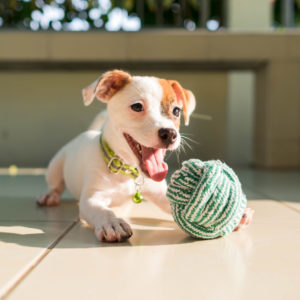Indoor cats are known to live longer and are at less risk of contracting infectious diseases or injuries due to trauma. However, they are at greater risk of developing behaviour problems without proper environmental enrichment. These problems can include urination/defecating outside the litterbox, anxiety, depression, aggression, eating disorders, and compulsive disorders such as excessive grooming. Below are some environmental enrichment ideas for your indoor cat that could decrease the chances of these behaviour issues occurring because of stress or boredom, keeping your indoor cat happy and healthy.
Scratching Posts
Cats naturally like to scratch on things because it leaves their scent behind; marking their territory and it stretches their muscles. Every cat is different when it comes to what scratching materials they prefer; you may have to try out more than one before you figure out what they like. Conventional materials are sisal rope, carpet, lumbar and cardboard. Cats may have a preference on whether they like to scratch vertically, horizontally or both. Therefore, careful consideration should be made before purchasing one for your furry friend. If your cat enjoys scratching vertically, make sure that the scratching post is tall enough for your cat to stretch all the way out.
Vertical Spaces
Cats need places to climb and observe the world around them. A higher vantage point allows them to feel safe while they watch their environment. This is especially important in multi-cat settings, as this diminishes the opportunities of another one to catch them by surprise. Cats may even use this as their favourite place to sleep. Good ideas for creating vertical space includes cat trees, sturdy shelves and hammocks that safely attach to windows.
Windows
Being able to look out of a window is very important for any cat. It provides them with plenty of stimuli that’s easy to miss out being indoors. Watching birds, squirrels, people, leaves blowing, and even experiencing new smells can keep them from becoming bored.
Hideaways
Sheltered areas for a cat is a must so they can hide if they choose to. This is not limited to timid kitties either; confident cats should have access to this as well. This can be as easy as getting a cat tree with holes or cabins, any form of tent sheltering, covered beds or even as simple as a cardboard box.
Toys
Playing is critical as this activity mimics hunting, a favourite pastime for outdoor cats. Toys provide both physical and mental activities for indoor cats who would otherwise succumb to boredom and otherwise would make toys of what is available. You can stimulate your furry friend with the use of interactive toys such as a mouse being pulled across the floor, a wand that is being waved through the air or having the cat chase a laser pointer. Cats need to be able to catch the “prey” once in a while, so they don’t get frustrated. As well, passive play such as giving them a kicker or catnip ball can be effective in providing them with plenty of hours of entertainment while you go about your day. Using food puzzles or food balls mimic’s the action of hunting for prey and provides a more natural eating habit for them. Always try to rotate what toys you place out for play, so your cat is less likely to be bored with them.
Written by Kendall Chiasson, RVT




